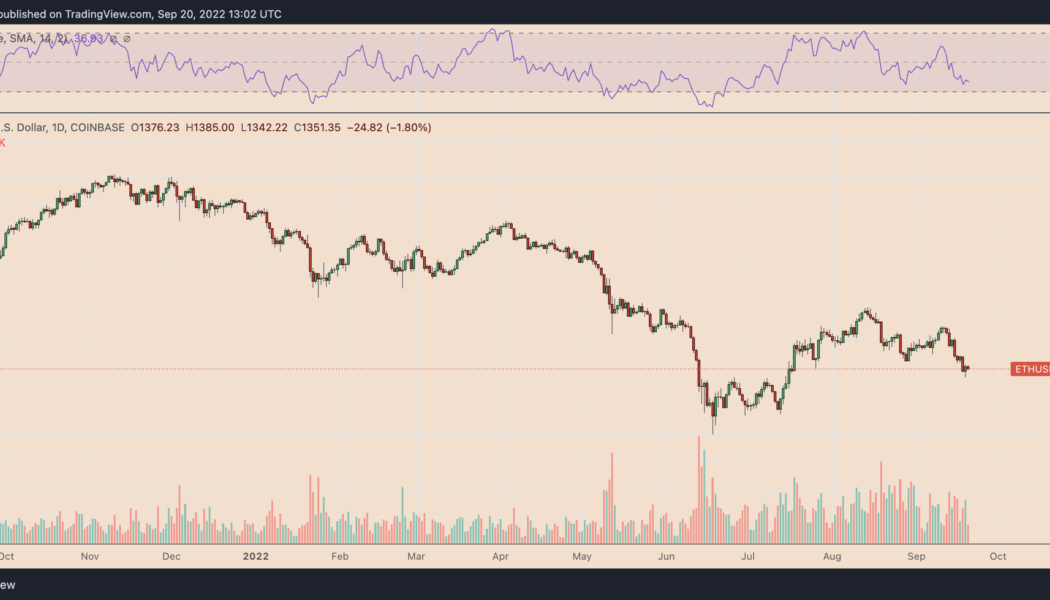crypto mining
Ethereum miners dump 30K ETH, stonewalling ‘ultra sound money’ deflation narrative
Ethereum’s switch to proof-of-stake (PoS) on Sept. 15 failed to extend Ether’s (ETH) upside momentum as ETH miners added sell pressure to the market. On the daily chart, ETH price declined from around $1,650 on Sept. 15 to around $1,350 on Sept. 20, an almost 16% drop. The ETH/USD pair dropped in sync with other top cryptocurrencies, including Bitcoin (BTC), amid worries about higher Federal Reserve rate hikes. ETH/USD daily price chart. Source: TradingView Ethereum remains inflationary The Ether price drop on Sept. 15 also coincided with an increase in ETH supply, albeit not immediately post-Merge. $ETH is now Ultra Sound Money pic.twitter.com/fKz6VmoWdR — DavidHoffman.eth (@TrustlessState) September 15, 2022 Roughly 24 hours later, the supply change flipped positi...
Sneaky fake Google Translate app installs crypto miner on 112,000 PCs
Crypto mining malware has been sneakily invading hundreds of thousands of computers around the world since 2019, often masquerading as legitimate programs such as Google Translate, new research has found. In an Aug. 29 report by Check Point Research (CPR), a research team for American-Israeli cybersecurity provider, Check Point Software Technologies revealed the malware has been flying under the radar for years, thanks partly to its insidious design which delays installing the crypto mining malware for weeks after the initial software download. .@_CPResearch_ detected a #crypto miner #malware campaign, which potentially infected thousands of machines worldwide. Dubbed ‘Nitrokod,” the attack was initially found by Check Point XDR. Get the details, here: https://t.co/MeaLP3nh97 #crypto...
OpenEthereum support ends with the Merge fast approaching
One of the most popular Ethereum (ETH) clients, OpenEthereum has ended support for its software in preparation for the upcoming Ethereum Merge. OpenEthereum creates “clients” or software used to interact with the Ethereum network allowing anyone to create an Ethereum node to mine the cryptocurrency which is currently using a proof-of-work (PoW) consensus mechanism. In a Twitter thread the OpenEthereum team explained that with the Merge approaching and the legacy codebase becoming “increasingly difficult to manage” due to its age that it was the right time to end support. OpenEthereum support has officially ended. The repo is now archived, and all maintenance and updates have stopped. Why? And what next? Read the — OpenEthereum is Deprecated (@OpenEthereumOrg) May 24, 2022 The project was f...
Kazakhstan ramps up power consumption reporting requirements for crypto miners
The government of Kazakhstan has laid out new reporting requirements for cryptocurrency mining operators with a keen eye on how the industry’s energy usage affects the local power grid. The order published by the country’s Minister of Digital Development earlier this week compels digital mining businesses to provide comprehensive information 30 days before starting operations. The electricity consumption and “technical specifications” for connection to the power grid must be provided before commencing operations. The amount and type of mining equipment used, the customs cargo declarations for that equipment and any investments planned for the next 12 months must also be included. Kazakhstan was flooded with an influx of crypto miners after the Chinese government cracked down on the p...
Go green or go home? What the NY State mining moratorium could mean for crypto industry
On April 26, the State of New York put itself at the forefront of the regulatory struggle with crypto, as its Assembly voted for a two-year moratorium on crypto mining operations that use energy generated by fossil-fuel power plants. Depending on how one looks at it, this development could either signal a new alarming legislative trend or a trigger that would accelerate the digital asset industry’s movement toward a more sustainable path. Moratorium with further evaluation The lower chamber of the NY state legislature, the Assembly, passed a bill that would put a two-year hold on any new mining operations using the proof-of-work (PoW) consensus mechanism, as well as on the renewal of existing permits. The bill, S6486D/A7389C, is marketed by its sponsors as a necessary act of complian...
US Bitcoin mining firm turns to harmful coal waste for cleaner energy
Stronghold Digital Mining (SDIG), a crypto mining company in Pennsylvania, is turning waste from old power plants into energy to power hundreds of Bitcoin mining rigs. The company collects coal refuse, a leftover waste material from the process of coal mining, and burns it in what it says is an emissions-controlled environment at its energy generation facilities. Coal refuse can cause a raft of environmental problems, such as water and air pollution, and acid mine drainage, the acidic water which comes from coal mining operations. Collecting this waste and safely disposing of it while generating power for crypto mining is a productive way of tackling the problem. The state of Pennsylvania is the third-largest producer of coal in the United States, estimates put the amount of coal wastage a...















